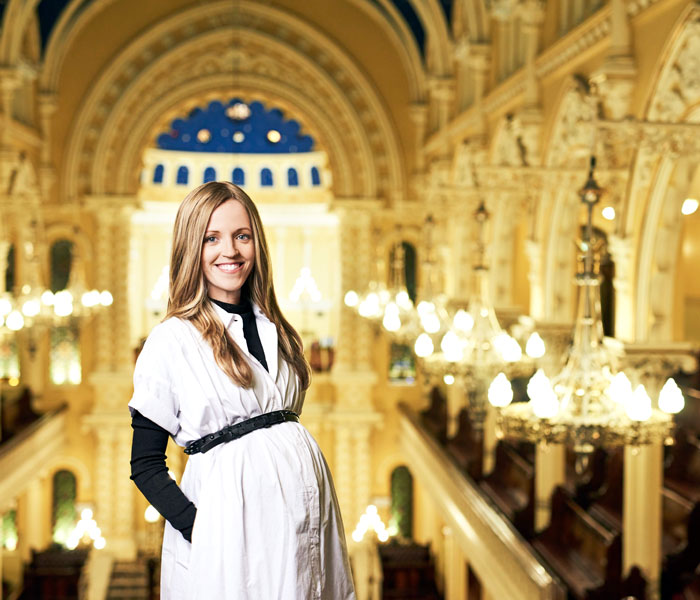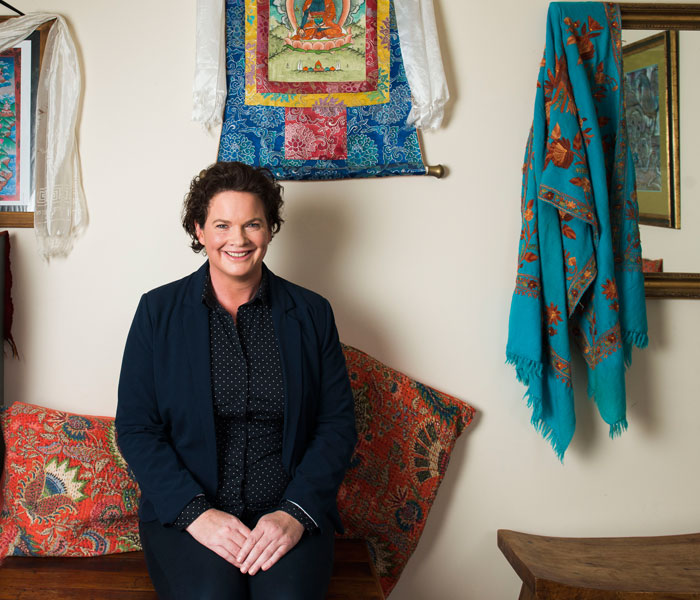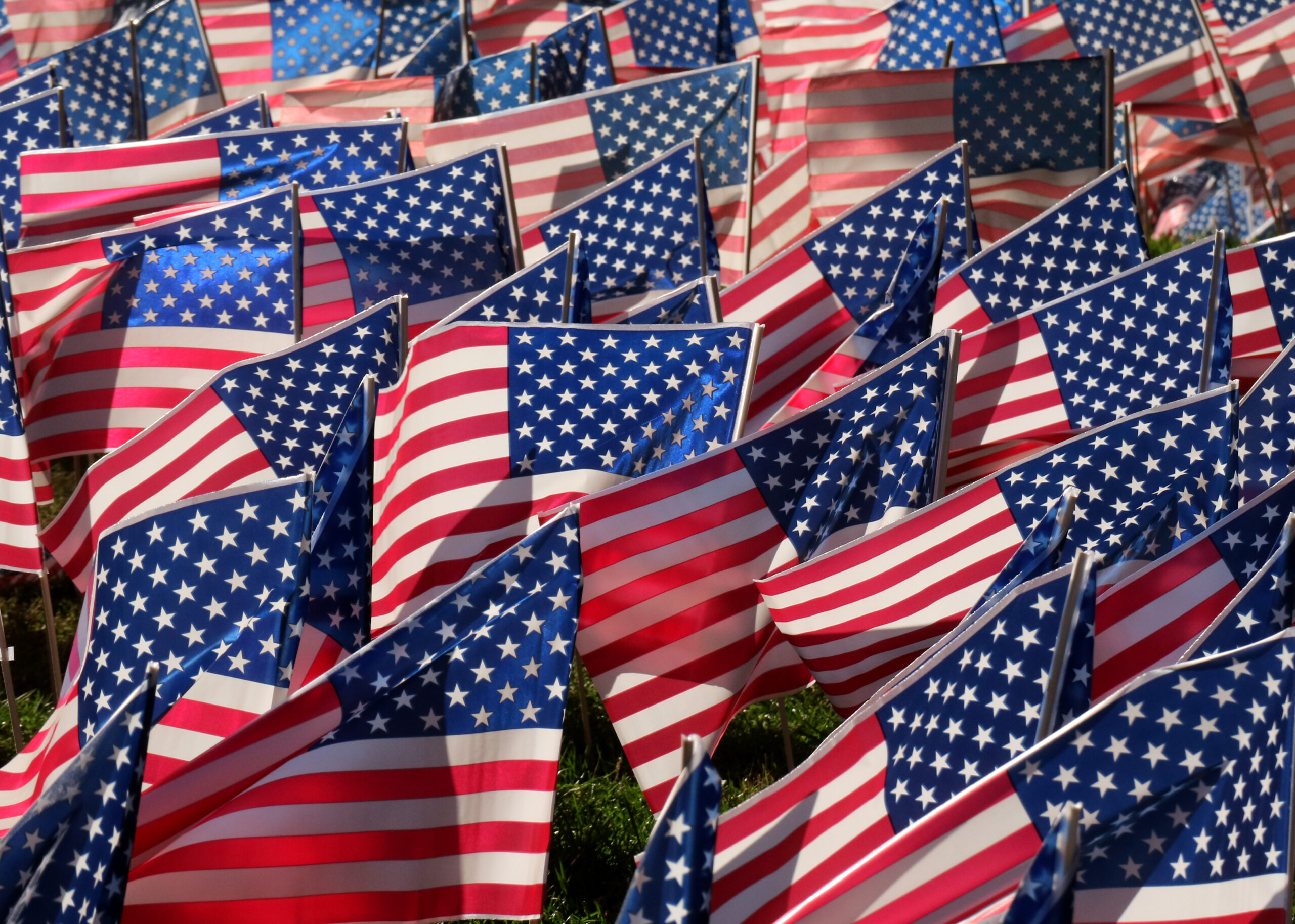Converting to Islam
Like many teenagers, Susan Carland was trying to figure out her identity and direction in life when she began questioning the religion she’d been raised with.
Growing up in a loving family in a regular suburban Christian home, she’d attended the Uniting Church as a child before switching to the Baptist Church as a teenager.
“I was very happy with the Christian faith I had grown up with,” she says. “It was so positive, I started going to my [church] role models with my questions.”
Yet her spiritual curiosity was still not quenched, so the then 17-year-old decided to embark on an exploration of other religions.
“I started to wonder why I believed what I did,” recalls Susan. “Was it because I genuinely believed it to be true or was it because it was what I was raised to believe?”
There was only one religion she really wasn’t interested in – Islam.
“I thought, why would anyone want to be part of a barbaric, outdated, sexist religion?” Susan says. Two years later, she became a Muslim.
In this year’s Australian Census, it’s quite possible that “no religion” will become the number one single answer to the question on religion. If so, it will overtake Catholicism, which has been the top response for the past three decades, and Anglicanism, which had been number one since records began (although Christianity is likely to stay on top if you combine all its denominations).
However, this is not the only change that’s been observed. Minority non-Christian religions, such as Buddhism, Hinduism and Islam, are bucking the trend, swelling in numbers as the larger churches downsize. A big part of the explanation, of course, is migration and population growth. Yet there’s another reason, too: people converting to faiths that resonate more deeply than the ones they were raised with.
Islam is growing in Australia, although contrary to public perception, Muslims still make up only 2.2 per cent of the population at last count (a survey in 2014 found Australians on average guessed the figure to be 18 per cent). When Dr Susan Carland, now a sociologist and academic at Monash University in Melbourne, converted at 19, that figure was just 1 per cent.
Despite her early avoidance of Islam, Susan says, “I kept coming across information about Islam in my reading and on TV until my interest was piqued.”
Given the internet hadn’t taken hold yet, she turned to books and a Muslim women’s group at university to find out more. After two years of research, a series of small epiphanies and much soul-searching, Susan decided she was ready to commit.
“Before I felt a spiritual connection to Islam, I felt a logical connection to it,” she says. “I found the emphasis on social justice appealing; I noticed there was a real concern for the vulnerable people in society. Islam codifies their right to be protected.”
Of making her new faith official, Susan says, “Becoming Muslim felt like coming home. It felt like a natural fit for me as a person.”
Susan’s intellectual interest in Islam continues to this day, with her PhD examining how Muslim women tackle sexism.
“Anyone who says there’s a contradiction between Islam and feminism doesn’t understand either,” she says.
Living according to Islamic values, dressing modestly and praying five times a day helps make her more mindful and reminds her to strive to be the person she wants to be, rather than surrender to her innate traits, such as selfishness, laziness or sarcasm, she says.
Nevertheless, her decision to convert came as a shock to her mother, who opposed it at first.
“Mum had some hesitations,” says Susan, “but I can see as a mother myself that if my kid came to me at 19 and said they wanted to get involved in something that I have only ever heard negative things about, it would be hard. Things are great with my mother now.”
It’s worth noting this was before 9/11, when exposure to Islam for many Australians was limited to foreign depictions on TV, film and in books such as Betty Mahmoody’s Not Without My Daughter, in which an American woman flees Iran and the tyranny of her Muslim husband.
Since then, of course, the public perception of Islam appears to have become inextricably linked to terrorism.
“There’s definitely still the fear and belief among certain people that Muslims are all terrorists and kill people or, if not, they are sleeper cells,” says Susan. “Ninety-nine per cent of what people see about Muslims in the media is negative. As consumers, we need to be switched on.”
Susan and her husband, award-winning Australian TV host Waleed Aly, with whom she has two children, are helping challenge such attitudes and stereotypes, although they face backlash for doing so.
For every hate tweet she receives, Susan donates $1 to UNICEF. “I can’t change them [the online trolls],” she says, “but I can respond in a way that reflects my values.”
Since October last year, she has donated about $4000.

Converting to Judaism
Getting dressed in the morning has been transformed for Cosmopolitan magazine’s online fashion editor Nikki Kinstlinger, who converted to Judaism in 2014. Five years ago, denim shorts, skinny jeans and short-sleeved tops were staples in her wardrobe. Today, the married 29-year-old is just as stylish, but wears only modest attire that covers her elbows, knees and collarbones.
As an Orthodox or observant Jew, she also covers her hair with a wig or scarf.
“My religion dictates every part of my life, from how I dress to what I eat and my social life,” she says. “It’s a constant consciousness that didn’t exist for me before. That would drive some people crazy, but for me, it’s reassuring.
“Married women cover their hair and dress modestly for myriad reasons. It also means your husband is going to be the only person who gets to see you in your natural form. I find that quite beautiful.”
Raised in a Christian family in the regional NSW town of Dubbo, where she went to Catholic school, Nikki says religion was always in the background of her life, but didn’t shift to the forefront until she discovered Judaism.
It was moving to Sydney’s eastern suburbs at 18 and making Jewish friends that sparked her interest.
“I was immersed in the culture and I fell in love with it,” she explains. “I love the community togetherness. It’s very family-orientated and no matter where you are, everyone feels every other Jew is their brother, whether you are in Israel or sitting around at Shul [synagogue] in Bondi. There was also an attraction to my now husband at the time – but I didn’t convert for him.”
Judaism provided answers to questions that Nikki hadn’t felt were adequately answered by Christianity, she says.
“I was a curious kid. I did religion at high school, but I never really understood the timing of events [in the Bible]. I remember saying, if Jesus was Jewish, why aren’t we all Jewish?”
Today, Nikki says she loves discussing theology with her friends and family, drawing on the Torah and practising ancient rituals. While Cosmopolitan’s focus on sex and celebrity may seem like an anathema, she considers her career separate to who she is.
When Nikki decided to embark on a two-year programme of learning in preparation for her conversion to Judaism, her family were supportive, if sceptical.
“At first, I assume, they thought I was just doing it to get married,” she says. “Dad was more shocked I was not going to eat pork or bacon again. When they realised it was because I wanted to be religious, there was some concern, and questions came flooding in.”
There are some aspects of Nikki’s life that separate her from family and old friends – such as her strict adherence to a kosher diet and being unable to attend events during the weekly Sabbath – but they manage to work around it.
“From Friday night to Saturday night, I am pretty much out of touch on my phone or anything,” she says. “We just exist in the world as it is.”
This includes no turning on switches, cooking or driving.
While Judaism is non-proselytising (meaning Jews don’t actively try to convert others to their faith), Nikki admits some people may have found her early evangelism annoying.
“Some people took it personally,” she says. “They saw it as trying to dictate how they live their lives. That was hard. Because I was a little too eager and probably overbearing at times.”
Becoming Jewish, she says, has given her more empathy for minority groups and the prejudices and hardships they face.
Nikki is expecting her first baby and hopes her children will keep the faith, which is passed down the mother’s line. Her husband Jeremy’s family has always been very welcoming and supportive, she says, even before she’d decided to convert.
“For some people, a convert isn’t good enough,” she says. “But they are really amazing.”

Converting to Buddhism
In her teens, Georgina Mira Riddiford fell in love with meditation and would often sit alone in her room, close her eyes and attempt to quiet her mind.
“As a child I had always taken myself off for quiet time. I needed time where there was silence and the opportunity to find a lot of peace.”
Baptised Catholic and educated at an Anglican school, Aucklander Georgina, who more often goes by her Buddhist name Mira, discovered Buddhism after searching for different religions that support meditation.
“I found myself meditating more and more. I knew it was something I really loved to do so I started to think I need to get some training in this.”
Mira says Buddhism is about developing clarity, calm, generosity, patience and kindness. While she says she loves the Catholic mass and all the hymns and traditions that come with it, she found that Buddhism, with its independence and lack of formal rituals, complemented her personality.
“The style I was drawn to was very progressive. I felt like I could still be myself. I didn’t have to give up everything I loved and enjoyed to be a part of it. This was something I could be true to. It felt really natural.”
Having been taught Tibetan Buddhism and the Burmese Insight tradition, she says there are very few rules and the focus is around living an ethical life.
She was also drawn to Buddhism because of the diverse range of people she interacted with.
“I study a form of Buddhism that has male and female teachers. It meant a lot to me to see female role models – I felt I could get relevant answers when I asked questions from a woman’s perspective. Some of my teachers also had children and I found that relatable.”
The mother-of-two has been training in Buddhism for two decades and says it helps her experience life on a more intimate level.
“It’s given me purpose,” Mira says. “I feel calmer now. Going on retreat can be very challenging, which I find thrilling, and it has made me feel blessed to be alive. I enjoy the heart-based compassion practices – they build the capacity to be truly present with others, to see people as they are, and support them to become all that they can be.”
Mira’s family were open-minded when she expressed her interest in Buddhism.
“I think they just saw me getting calmer and calmer and thought, ‘Wow, she looks happy.’”
While her children are already showing a love of Buddhism, she says, “It’s not up to me to convert my children. It’s either something they want to do or they don’t. I would be happy just to encourage them to do something they love.”
She travels three or four times a year, often with her children in tow, to the Wangapeka Study and Meditation Retreat Centre in the foothills of the Southern Alps. Here she is on the board of trustees and teaches Mindfulness and a Western form of meditation called the Western Mysteries. She says she loves going there knowing she will be surrounded by quiet and kindness.
Despite being a qualified graphic designer, Mira’s primary job now is as a meditation teacher. She teaches classes and retreats across the country and has people travelling from all over the world to study with her.
Like Susan and Georgina, Nikki feels certain her chosen religion is for life.
“You have got to let go of the convert part,” she says.
Words: Clair Weaver and Therese Henkin




